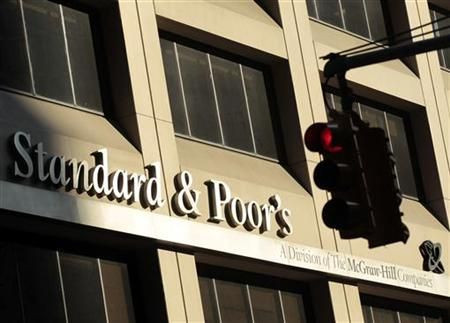S&P Cuts Italy One Notch, Outlook Negative

Standard and Poor's cut its unsolicited ratings on Italy by one notch, warning of a deteriorating growth outlook and damaging political uncertainty, in a move that took markets by surprise and added to pressure on the debt-stressed euro zone.
S&P's downgraded its unsolicited ratings on Italy to A/A-1 from A+/A-1+ and kept its outlook on negative, sending the euro more than half a cent lower against the dollar.
The agency, which put Italy on review for downgrade in May, said that the outlook for growth was worsening and there was little sign that Prime Minister Silvio Berlusconi's fractious center-right government could respond effectively.
Under mounting pressure to cut its 1.9 trillion euro debt pile, the government pushed a 59.8 billion euro austerity plan through parliament last week, pledging a balanced budget by 2013.
But there has been little confidence that the much-revised package of tax hikes and spending cuts, agreed only after repeated chopping and changing, will do anything to address Italy's underlying problem of persistent stagnant growth.
We believe the reduced pace of Italy's economic activity to date will make the government's revised fiscal targets difficult to achieve, S&P's said in a statement.
Furthermore, what we view as the Italian government's tentative policy response to recent market pressures suggests continuing future political uncertainty about the means of addressing Italy's economic challenges, it said.
Budgetary savings may not be possible because the government is relying heavily on revenue increases in a country that already has a high tax burden and is facing weakening economic growth prospects, S&P said. In addition, market interest rates are expected to rise, it said.
Berlusconi's coalition has been plagued by infighting and policy disagreements and the prime minister himself has been battling a widening prostitution scandal which has distracted the government and badly damaged his personal credibility.
On Monday, Italian sources said the government was preparing to cut its growth forecast to 0.7 percent in 2011 from a previous forecast of 1.1 percent and cut its 2012 forecast to 1 percent or below.
SURPRISE MOVE
Italy, the euro zone's third largest economy, has been dragged to the center of the debt crisis over the past three months as concern has grown over a debt burden equal to some 120 percent of its gross domestic product.
But the move from S&P was a surprise because the market had thought Moody's was more likely to downgrade Italy first. Moody's last week said it would take another month to decide on its action.
Was it anticipated tonight? No. But again is it really shocking given what yields have done? said James Paulsen, chief investment strategist, Wells Capital Management.
Only the European Central Bank, which has been buying Italian bonds to prop up the market, has kept Rome's borrowing costs from spiraling out of control, but yields have crept back up steadily since the ECB stepped into the market in August.
On Monday, yields on Italian 10-year bonds stood at 5.59 percent, within sight of above 6 percent they had reached just before the ECB intervention.
The intervention has caused growing strain within the central bank, causing Chief Economist Juergen Stark to announce his resignation and prompting open opposition from the Bundesbank.
The S&P downgrade, which came as Greece struggles to meet demands from lenders for yet more austerity measures, underlined the mounting seriousness of the euro zone crisis, which has rattled global markets.
It's just more of the same negative news, said Stephen Roberts, a senior economist at Nomura in Sydney.
It only adds to the contagion risk over Greece and has encouraged the flight to safety in markets here, he added, pointing to a sharp fall in the Australian dollar on the news. The Aussie dollar is influenced by expectations for commodity prices and so sensitive to the outlook for global demand.
S&P 500 futures dropped 0.6 percent and Asian shares fell.
European stocks slid on Monday, while yields on Italian and Spanish bonds rose sharply on fears of a Greek default, compounded by the failure of EU finance ministers to agree new steps to resolve Europe's debt crisis at weekend talks.
Coming at a time when the world's financial markets are on the edge, warily watching for a default by Greece with knock-on unknown effects on the financial system, the optics of this downgrade stink, said Carl Weinberg, chief economist with High Frequency Economics in New York.
International lenders told Greece on Monday it must shrink its public sector and improve tax collection to avoid running out of money within weeks as investors spooked by political setbacks in Europe dumped risky euro zone assets.
(Reporting by Wayne Cole in Sydney and James Mackenzie in Rome; Additional reporting by Daniel Bases and Burton Frierson in New York; Editing by Phil Berlowitz and Kavita Chandran)
© Copyright Thomson Reuters 2024. All rights reserved.




















